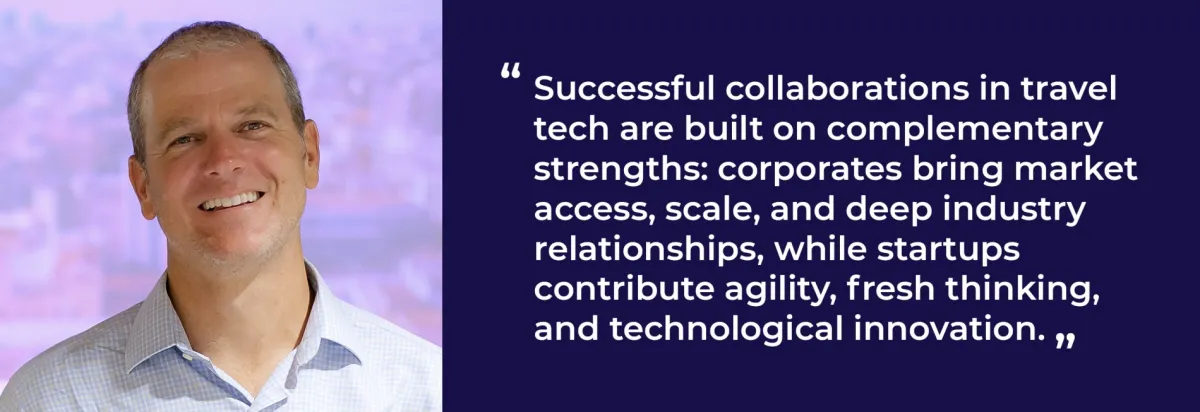travel technology
eDreams
travel agencies
travel and hospitality
Mauricio Prieto: Shaping the Future of Travel Tech

travel technology
eDreams
travel agencies
travel and hospitality
Mauricio Prieto is one of the most influential minds in travel technology, with a career that spans from co-founding eDreams, one of the world's largest online travel agencies, to launching Travel Tech Essentialist, a go-to platform for insights into the future of travel and hospitality. His journey is a testament to how vision, adaptability, and innovation can redefine an industry.
Originally from Mexico, Prieto’s academic path led him to Princeton University, followed by an MBA at UC Berkeley. His early career included consulting at Booz Allen Hamilton and product development at Charles Schwab. However, it was in 1999 that he made his mark, co-founding eDreams, which rapidly expanded to 48 countries, achieving a $5.5 billion booking volume and a successful IPO in 2014.
Now, with Travel Tech Essentialist, Prieto is focused on guiding the next wave of travel entrepreneurs, bridging the gap between innovation, investment, and industry knowledge.
Through Travel Tech Essentialist, Prieto provides invaluable insights and resources for travel tech founders and investors. His expertise spans AI-driven personalization, digital transformation, and the ever-evolving landscape of travel startups. He is also a board member of several travel tech companies and an advisor to key industry players.
BAE Ventures caught up with him to discuss the future of travel technology, the role of startups, and what investors should be looking for in the sector.
1. What’s the next big innovation that will reshape the travel industry?
The most transformative innovation in travel isn't a single technology; it's a fundamental democratization of who can create travel solutions. Just as YouTube transformed anyone with a camera into a potential content creator, AI tools are democratizing software development in travel. The implications are profound: we're moving from roughly 100 million software engineers today to potentially over a billion software creators in the near future.
This means that every traveler who has experienced a pain point becomes a potential problem solver. Instead of waiting for the next billion-dollar travel unicorn, we'll see millions of specialized solutions thrive. Individual entrepreneurs can now build and operate sophisticated travel products that previously required entire teams.
The future of travel technology won't be dominated by a handful of giant companies, but energized by millions of specialized solutions that naturally complement each other. As I explored in Travel Tech Essentialist #163, this shift is creating opportunities we haven't even imagined yet - from hyper-personalized travel experiences to entirely new categories of travel services.

Source Travel Tech Essentialist,
2. What makes a startup-corporate collaboration successful in travel tech?
Successful collaborations in travel tech are built on complementary strengths: corporates bring market access, scale, and deep industry relationships, while startups contribute agility, fresh thinking, and technological innovation.
I'd highlight two key elements in successful startup-corporate partnerships:
First, they focus on complementary strengths rather than overlapping ambitions. Corporates provide invaluable access to distribution channels and customer bases, while startups bring rapid innovation cycles and unconstrained thinking.
Second, they maintain clear alignment while preserving independence. The best collaborations set clear objectives but give startups the autonomy to execute in their own way. This balance allows startups to maintain their innovative culture while leveraging corporate resources effectively.
The end result is powerful: corporates gain new capabilities and market opportunities, while startups achieve the scale needed to create lasting impact in the travel industry.
3. How will AI and data redefine traveler expectations in the coming years?
We're heading toward two distinct types of travel experiences. On one side, AI will handle the computational aspects: finding flights, comparing hotels, optimizing itineraries, making these processes more efficient than ever. But on the other side, we'll see a growing emphasis on authentic human experiences that AI simply can't replicate.
This isn't just theory, we're already seeing it in action. TripAdvisor recently doubled its review page traffic not by creating AI content, but by using AI to make real human reviews more helpful. That's telling: travelers want AI to enhance human insights, not replace them. A recent poll in Travel Tech Essentialist showed something interesting: while 31% believe AI will replace traditional customer service, only 13% actually want this to happen (poll results). This gap between what's possible and what's desired suggests the future isn't about AI taking over everything; it's about finding the right balance.
The winners will be those who understand this dual nature: using AI to perfect the predictable parts of travel while creating space for the unpredictable moments that make travel memorable. It's not about AI versus human experience, but about using AI to give humans more time for real experiences.
4. From eDreams to Travel Tech Essentialist, how has your view on industry disruption evolved?
My perspective has evolved significantly. When we built eDreams in 1999, disruption was all about execution: being first to market, scaling quickly, building infrastructure and having superior technology. We were focused on displacing traditional players, primarily by being faster, more efficient at distribution and with a distinctly better product. I recently wrote about this in From Zero to IPO, sharing how we built eDreams into Spain's first unicorn in an era before startup playbooks existed.
Today, the game has completely changed. AI has transformed the competitive landscape, handling much of the execution that once differentiated companies. This has created space for a different kind of innovation, focused on reimagining what travel can be rather than just making existing processes more efficient.
I'm also seeing a fundamental change in how disruption happens. An AGC Partners Travel & Hospitality Tech Market Report I recently shared shows B2B and hospitality innovation now commanding 39% of the travel M&A market. The focus has shifted from pure distribution to broader value creation. Looking ahead, I expect the biggest opportunities will come from companies that create entirely new travel categories rather than those tryingto optimize existing ones.
5. What key factors make a travel startup investment-worthy today?
I'd highlight three key factors that make a travel startup investment-worthy today:
First, a clear understanding of whether the company is optimizing for AI efficiency or human experience. Trying to do both often leads to mediocrity in both. The most successful companies are those that choose their lane clearly and carefully.
Second, the potential of 'micro-scale' success. Unlike the past where every travel investment needed unicorn potential, I'm seeing opportunities for highly profitable companies at much smaller scales, especially with AI reducing operational costs. This 'anti-unicorn' approach can actually lead to better risk-adjusted returns.
Third, the ability to build personal brands alongside company brands. We're seeing a significant shift where personal brands are outperforming corporate messaging. Look at Airbnb's Brian Chesky; his personal social media posts generate millions of impressions compared to tens of thousands on Airbnb's corporate accounts. As I wrote in The End of Faceless Brands, this trend could lead to travel companies doing M&A deals with influencers or giving them significant ownership stakes to access their distribution power. This makes more sense than pouring billions into marketing channels that generate transactions but don't necessarily build loyalty and preference.
These kinds of questions are regularly explored in Travel Tech Essentialist, my bi-weekly newsletter for travel tech leaders and investors.
Mauricio Prieto’s work continues to shape the industry, offering strategic insights that help startups and investors navigate the fast-changing world of travel technology. As BAE Ventures continues to foster collaboration between corporates and innovators, thought leaders like Mauricio play a crucial role in defining the next chapter of travel.



